Here comes 'da judge. Yes, that's
you!
 You've been asked to
judge for the very first time. You're pleased. You're flattered. You're terrified. You've
suddenly realised there might be some things you might not know or havenít been told about.
Experienced judge Lesley Wilks passes on some tips for 'debutante' judges on what to do before,
during and after the class. You've been asked to
judge for the very first time. You're pleased. You're flattered. You're terrified. You've
suddenly realised there might be some things you might not know or havenít been told about.
Experienced judge Lesley Wilks passes on some tips for 'debutante' judges on what to do before,
during and after the class.
First of all, there are four essentials you need to have
with you.
- A copy of
the rules and regulations. No doubt the club hosting the competition has a copy, but you
might want to instantly refer to something at the ringside.
-
A measure or rule of some sort for checking the height
of jumps, tyre, weave pole distances etc. Never assume they are correct.
-
A whistle
-
A stop watch
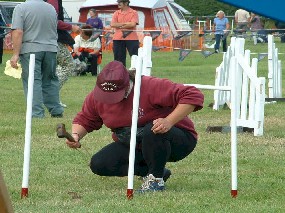 It
is also useful to keep a copy of your course with you. Even if you have sent it on to be set
up, you may well arrive at your ring and the obstacles look nothing like the course you had in
mind! It
is also useful to keep a copy of your course with you. Even if you have sent it on to be set
up, you may well arrive at your ring and the obstacles look nothing like the course you had in
mind!
Ensure everything is well pegged with the pegs in a safe
position.
Try to have a separate start/finish for efficient throughput
of competitors. A few seconds saved between runs can add up to a lot of minutes at the end of a
long, hot day.
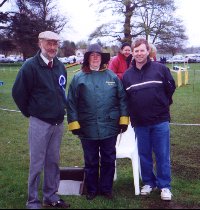 Ring
party Ring
party
Before briefing the
competitors, you should brief all your ring party so everyone is clear which job they are doing
and what is expected of them.
-
Suggest to the ring manager when you would
like to stop for a break.
-
Place jump stewards where you think poles are
most likely to fall.
-
Make sure they know they must not interfere
with the dog/handler working in the ring.
-
Make sure the exit of the floppy tunnel is
pegged or have someone there to straighten it after every dog.
-
Suggest which way you
would like the queue to go. (Away from the caller, score table, finish etc.)
-
State the maximum number
of dogs you would like in the queue according to weather conditions.
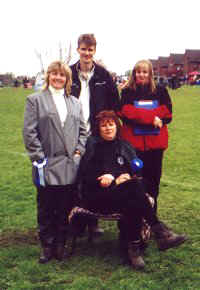 Scrimer Scrimer
The scrimer is your closest ally.
-
Show them how you will signal the different faults
- pole, refusal, missed contact,
handling dog, ELIMINATION etc.
-
Once the dog has cleared the first obstacle, make sure they know to glance
quickly at the timing thus ensuring the 'clock'
has started.
-
Remind them they have the
unenviable task of watching you and you alone throughout. They must not be distracted by
laughter, a commotion, something they think theyíve glimpsed out of the corner of their
eye!
-
If you are able to do so, have the score table near the
scrimer although not in the way of start or finish.
-
Always check the results at the end of the class.
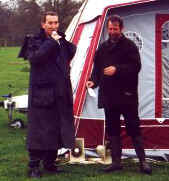 Judge's
briefing Judge's
briefing
From the moment you do your Judge's Briefing, you are in control. You will be judging to
standard Kennel Club rules but donít forget to mention anything extra you personally will fault
that may not be covered by the rule book such as the Clock failing to start because dog runs
round first obstacle, failure of timing equipment etc.
In the
ring
Walk
into that ring and take charge. Remember, anything that happens in that ring is your
responsibility... mostly.
You will probably be nervous for the
first 10-20 dogs, especially if there is no clear round. After the first clear, however, youíll
begin to relax and then youíll really start to enjoy yourself.
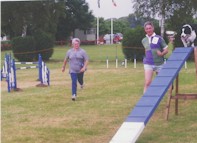 When
there are contacts, remember to watch the yellow or whatever colour. Concentrate on that one
patch of colour and if you see any part of the dog touch it they cannot be faulted. If you have
any doubt then the dog must be given the benefit. When
there are contacts, remember to watch the yellow or whatever colour. Concentrate on that one
patch of colour and if you see any part of the dog touch it they cannot be faulted. If you have
any doubt then the dog must be given the benefit.
Applaud clear rounds. If you think a dog has run well yet
collected faults donít be afraid to clap. Did you ever watch Alan Hale? He claps everyone who
has handled their dog well.
You will see strange things occur, especially in the lower
classes. You will have to make an instant decision and stick to it. As long as you are
consistent and judge every dog the same way, it doesnít matter.
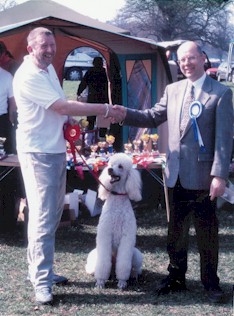 Happy
ending Happy
ending
Make the most of the presentation. These are
competitors who have enjoyed your course, who have run it well and are happy to be receiving
their rosette.
Remember to thank those you think deserve it! Be gracious in
accepting whatever gift you may receive. Finally
-- donít forget
to claim your expenses or donate them to charity or whatever!
Best of all - Go out there and enjoy it
because it can be fun.
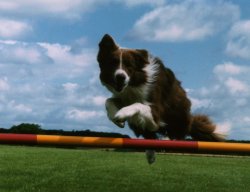 About
the author... About
the author...
Having played around
with ponies for many years with some success in Prince Philip Mounted Games, show jumping and
one day events, Lesley Wilks saw agility at Olympia and decided she wanted to take part.
After all, you canít fall off a dog, only over it!!
It wasnít until she moved to Daventry that she found a club that trained the
discipline. After sailing through their Obedience course, she commenced agility training, and
five months later was let loose on the agility circuit at
her very first show. That was it. She was bitten by the bug and has been an addict ever since!
Lesley was thoroughly spoiled by her first dog as he
achieved a clear round at his first show, went from Starters to Advanced in six months
(although the category wasnít around at the time) and qualified for every major final
cumulating in a win at Crufts in 1995.
Since then, she's had two other Senior dogs - one now
retired - as well as a superb Flyball dog who helped her team qualify for every final they
contested, a 'failed' sheepdog that she took over at 22 months old from her husband who
has turned out to be a super little Novice dog with ten seconds and eight third places, and she
is now training yet another youngster.
Lesley has traveled the length and breadth of the country,
met some super people and, best of all, had fun with my her Cherwell Collies.
Photos: Janet
Baxter (Flynn the Rogue Runner), Ellen Rocco (ring parties) & Eric Trafford (weave poles)
|